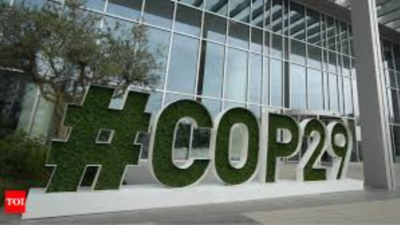
BAKU: The next 24 hours of negotiation here at the UN climate talks (COP29) appear to be quite arduous as the latest draft text on the post-2025 climate finance goal, released on Thursday, remains incomplete without the concrete numbers (quantum of annual finance till 2035) in it, despite the unwavering demand of developing countries.
Different options, including the one ($1.3 trillion per year) being demanded by developing countries, are bracketed in the text, but it will take a lot of hard negotiation to arrive at a landing zone before the conclusion of the talks on Friday. The amount to be finalised here will replace the existing finance goal of $100 billion per year (2020-25).
Though the text is reduced to 10 pages from the 25-page previous version, it lacks clarity on several issues concerning the climate finance to be provided to the developing countries for the implementation of their climate action. However, on the positive side, it mentions prioritising grants, 50% of non-debt funding, ‘loss and damage’, the importance of a just energy transition, and the fulfilment of human rights.
Besides finance (called the New Collective Quantified Goal), multiple texts on other issues—carbon market, mitigation, and adaptation fund—were also released on Thursday. Differences are expected to be thrashed out before bringing the final decision text on Friday. As the issues are being discussed in the plenary, even rich nations aired their concerns on several points, saying the text offers no progress.
“The revised draft text, while more streamlined, presents a spectrum of options—some good, some bad, and some outright ugly. It recognises the need to prioritise grants but remains silent on the critical scale of the new finance goal, instead shifting pressure onto developing countries to mobilise more domestic resources,” said Harjeet Singh, Global Engagement Director for the Fossil Fuel Non-Proliferation Treaty Initiative.
Referring to an impending task before the developing countries’ negotiators, Singh said, “We must focus not only on the vast sums required—trillions, as acknowledged—but on ensuring these funds are provided as grants, not loans, to shield nations most impacted by climate change from further financial burdens.”
Many experts believe that the latest draft NCQG text remains “glaringly incomplete” without the concrete numbers for the finance goal, which is the cornerstone of any agreement at COP29. As far as the contributor base is concerned, the text offers an option saying the developing countries willing to contribute may voluntarily do so without being accounted as NCQG.
“We are disappointed to see no clear NCQG numbers in the draft text that has been streamlined and includes some strong options and good elements. However, our biggest concern is that this text explicitly tries to erode all references to historical polluters’ obligation to pay under the Paris Agreement and is an attempt to prepare the ground for a private sector-led global finance goal with minimal accountability on developed countries,” said Sanjay Vashist, Director, Climate Action Network South Asia (CANSA).
Sensing the urgency amid divergent views over the text, the UN Secretary-General António Guterres, meanwhile, directly appealed to ministers and negotiators to soften their hard lines and navigate a path through their differences for a “bigger picture”. “We need a major push to get discussions over the finishing line to deliver an ambitious and balanced package on all pending issues, with a new finance goal at its heart. Failure is not an option,” said the UN chief.
Meanwhile, during the ongoing plenary on the texts, a European Union (EU) representative told the negotiators that the text is “imbalanced and unworkable, and unacceptable,” whereas the Umbrella Group (the US, the UK, Australia, New Zealand, Japan, Iceland, Israel, Norway, Ukraine, Kazakhstan, and Canada) sought clarity on the overall finance package. Australia wants the new finance mobilisation goal to apply to even developing countries.
A speaker on behalf of the ‘G77 plus China’, representing 134 developing countries including India, told the plenary that the group members cannot leave Baku without a clear quantum of finance as they need a mobilisation goal (public finance from developed to developing countries) of at least $500 billion per year out of the total package of an annual $1.3 trillion.
